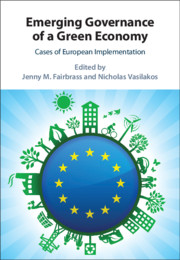Book contents
- Emerging Governance of a Green Economy
- Emerging Governance of a Green Economy
- Copyright page
- Contents
- Figures and Tables
- Contributors
- Preface
- Book Synopsis
- Acknowledgements
- Abbreviations
- 1 The Green Economy
- 2 The Green Economy
- 3 The Green Economy as Good Governance
- 4 On the Verge of a Second Revolution in the European Union’s Utilities Market for Energy Production?
- 5 ‘Great Expectations’
- 6 Overcoming Structural Disadvantages with Local Green Economies?
- 7 Shifting Models of Energy Companies towards Green Economy in Europe
- 8 Carbon Calculation and the Urban Green Economic Opportunity
- 9 The Green Economy
- Index
- References
6 - Overcoming Structural Disadvantages with Local Green Economies?
The Case of Two Maritime Cities
Published online by Cambridge University Press: 20 January 2021
- Emerging Governance of a Green Economy
- Emerging Governance of a Green Economy
- Copyright page
- Contents
- Figures and Tables
- Contributors
- Preface
- Book Synopsis
- Acknowledgements
- Abbreviations
- 1 The Green Economy
- 2 The Green Economy
- 3 The Green Economy as Good Governance
- 4 On the Verge of a Second Revolution in the European Union’s Utilities Market for Energy Production?
- 5 ‘Great Expectations’
- 6 Overcoming Structural Disadvantages with Local Green Economies?
- 7 Shifting Models of Energy Companies towards Green Economy in Europe
- 8 Carbon Calculation and the Urban Green Economic Opportunity
- 9 The Green Economy
- Index
- References
Summary
This chapter assesses the attempts of maritime port cities to use the green economy in a bid to overcome long-term structural disadvantages. It argues that these cities perceive climate change not only as a threat but also as an opportunity for ‘green’ growth in the form of new technologies and industries (such as the renewable energy industry). However, the emerging literature on the green economy underlines the dangers of uneven chances to exploit economic opportunities, reinforced locational competition, and the prevalence of technocratic, instead of transformative, strategies. Bremerhaven (Germany) and Hull (UK), two coastal cities that suffered major economic setbacks as a result of severe declines in local maritime industries (e.g. fisheries and shipbuilding), are used as case study cities. Albeit with differing strategies, both cities have turned to renewables, especially offshore wind, and the ‘green’ improvement of public housing as a source of jobs and growth. This chapter analyses how local green economies can develop, and what impact they may have on cities’ economies. The cases also exhibit the challenges that cities can face in trying to maintain their role as centres for the green economy, including through financial restrictions (a hallmark of structurally disadvantage cities exacerbated by austerity), regional competition and changing national policy contexts.
- Type
- Chapter
- Information
- Emerging Governance of a Green EconomyCases of European Implementation, pp. 90 - 106Publisher: Cambridge University PressPrint publication year: 2021

